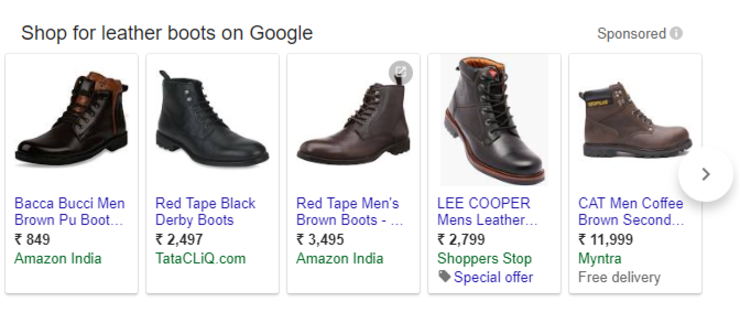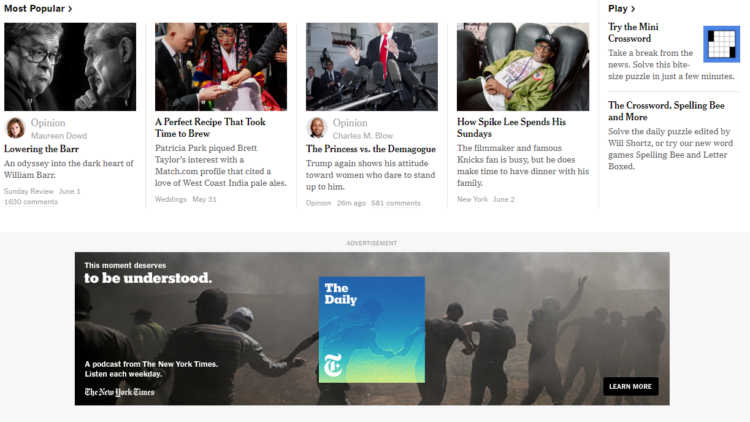Top 16 Myths about Google Ads

Google’s online advertising platform was launched on October 20, 2000. Since then, many myths have grown up around Google Ads and this in turns means that entrepreneurs often misuse the potential of their brands, burn budgets or even completely give up their Google Ads campaigns. Below you can see the top 16 myths about Google Ads. Keep reading our article to find out if any of these issues hamper your business.
Myth 1 – no one even clicks on Google Ads
If that were true, Google probably wouldn’t be the largest media company in the world. Advertising revenue in 2017 was over $100 billion. As shown by the statistics, a well-prepared and accurate advertisement is willingly clicked by Internet users and most of them treat the sponsored links as answers to queries or phrases, rather than as advertisements. So where does this myth come from? Well, probably it’s perpetuated due to the fact that there are people who deliberately don’t click on the advertisements. These are, for example, the ones that are searching the net for specific information but aren’t necessarily interested in making the purchase so when they see that a sponsored ad presents a specific offer they simply skip it. On the other end of the spectrum, there are also users who intentionally click on the adverts. These are often persons more aware and willing to buy who are looking for a place which offers products that will meet their expectations. In this case, the users’ purchasing power is noticeably greater. Such customers will not only eagerly click on advertisements that satisfy their needs but they’re also more prone to make a conversion after being redirected to the website.
Myth 2 – Google Ads is only about advertising in the search engine
There is a reason why, after almost 18 years of existence, Google AdWords underwent rebranding and appeared under the new name of Google Ads. Google with its wide range of advertising possibilities doesn’t want to be associated only with the search engine and keywords anymore. Google Ads is a powerful advertising ecosystem, which apart from the Google search engine uses such platforms as: Google Play, Google Maps, Gmail, YouTube or the Google Display Network (e.g. The Guardian or The New York Times). However, many entrepreneurs forget about this option and unfortunately limit themselves only to the Google search engine, thus losing additional possibilities of reaching the recipients and consequently hindering further development of their business.
Myth 3 – Internet advertising equals pop-ups
The publisher, not Google or the advertiser, is the person responsible for determining the advertising space, therefore it’s up to the website owner to decide how the advertisement will be displayed. Generally Google advises against pop-up ads and in the case of illegal practices such as a moving button hampering closing a window, Google may block the website owner’s account in Google AdSense.
Myth 4 – Google Ads costs an arm and a leg
Many entrepreneurs mistakenly believe that Google Ads is a tool exclusively for large companies with impressive advertising budgets at their disposal which can afford to spend tons of money on advertising. And they couldn’t be more wrong! Google Ads is perfect for local and small businesses. It enables to target your advertising strategy at a precisely defined group of users who live in a particular town or region and might be interested in your products or services. What’s more, exact targeting criteria not only reduce the advertising costs but also increase your efficiency. Many companies invest millions in banner ads, leaflets and TV or newspaper advertisements and at the end of the day, they aren’t even able to check and measure their effectiveness. This isn’t the case when it comes to Google Ads, additionally, the platform doesn’t impose any minimum budget – clients themselves determine not only how much they want to spend on advertising but also their daily budget and the maximum cost-per-click, impression and conversion bid. Well prepared, run and optimized campaign allows to reduce expenses while maintaining high effectiveness. To learn more about the costs of Google Ads, go to our previous article: Google Ads – How Much Does It Cost?
Myth 5 – I can’t see my advertisements so Google Ads doesn’t work
Your campaigns and ads are active, balance is positive and according to the panel the ads are displayed on one of the first positions in the search results but you’re starting to get worried as you haven’t come across your ads even once? Stay calm. The owners of the company or its employees aren’t the target group. By blocking the company’s IPs, the advertising agency protects itself against overzealous checking of the advertisements by the companies. Obviously, if you check your ads you generate impressions but you don’t click on them – consequently, the number of impressions increases but the number of clicks stays at the same level. The CTR drops and thus the quality of your advertisements deteriorates, which in turn may increase the cost-per-click bid and bring about other negative factors that affect how the ads are displayed.
Myth 6 – Google Ads affects SEO of your website
This is another myth that’s rooted in the subconscious of many entrepreneurs. There is no doubt that Google Ads isn’t an SEO activity, nor does it directly affect SEO results. The one and only situation when Google Ads has an indirect impact on SEO is when a shop or a brand becomes very popular and Internet users talk about it due to its advertising. As a result, a natural linking process on forums, blogs, etc. takes place.
Myth 7 – I do SEO so I don’t need Google Ads
It goes without saying that Google Ads and SEO complement each other. You’ll achieve the best possible results by creating a marketing strategy that comprises both these elements. Contrary to SEO, Google Ads is more flexible, it provides analytical background and full cost control. Moreover, thanks to it you can quickly get to the top of the Google Search results. As a result, Google Ads often acts as a kind of support for SEO activities as it enables to display the website high in the search results even when SEO hasn’t been run or there is no point in doing it as, e.g. the campaign is time-restricted. This ensures that even before the effects of SEO activities become visible, the website isn’t time-limited and doesn’t lose its potentially interested users.
Myth 8 – I don’t sell online so Google Ads isn’t for me
“Traditional or maybe online advertising?” – this is a question that gives many entrepreneurs sleepless nights. While looking for an answer you’ll probably realize that even when people see a banner ad or a leaflet, later they’ll probably search the net to find reviews or places where they can purchase a given product or use a service. And if users can’t find your offer on the Internet, they’ll probably choose the competition on the market, despite having seen your banner or leaflet. In the vast majority of cases, Google Ads and online advertising in general isn’t only about an attractive presentation of the brand, but it also creates a hyperlink which makes it possible to access more information and details about the offer. When it comes to a traditional form of advertising, targeting or choosing the place and time of emission of your ads is quite limited. Moreover, the analysis of leaflets, banners, radio or television advertisements’ effectiveness is rather complicated. The Internet gives you a wide range of analytical possibilities. When you decide on a banner ad or a sponsored link in Google Ads you can precisely determine the number of people who clicked on the ad and took advantage of your offer. Owing to this, you can get to know your clients or customers better and improve your online and offline advertising campaigns.
Myth 9 – It’s not worth to advertise on brand phrases in Google Ads
Due to being ranked high for brand phrases in the organic search results, business owners often give up on paid advertising campaigns because they feel that there is no point in paying for traffic that can be attracted for free through the organic search results. However, remember that the competition never sleeps.
Myth 10 – Rivals on the market will maliciously click on my ads
Indeed, such a problem arose at the initial stage of implementing Google’s online advertising platform. Fortunately, Google cares about the advertisers’ trust therefore it quickly and effectively eliminated the issue. Today, thanks to the cookies, the system can easily detect any irregularities such as a suspicious number of clicks in a short time and then exclude them from the settlement as the incorrect ones. The Google’s algorithm is fast enough to spot all unusual situations before the advertiser’s account is debited.
Myth 11 – A higher bid will increase my visibility
Well, will it? It depends. The bid is just one of the elements that affect the position and visibility of the advertisement. Each time your advert is displayed, it takes part in the ad auction and is appropriately ranked as a consequence. This ranking, on the other hand, determines whether and in what position your advertisement will be displayed. How your ad is ranked results not only from the bid but also from the quality of your advertisements and landing page, Ad Rank thresholds, the search context or the expected impact of ad extensions and formats.
Myth 12 – In order to sell I have to be in the top positions
When talking about the positions in respect of sales, you need to consider a few elements. The traffic gained and its costs are very important, however, the amount of obtained conversions and the cost of a single conversion are the key factors. In most cases higher positions usually mean more clicks but then the conversion cost also gets higher. Try to strike a happy medium for your budget and advertisements. Often a fall from an average position of 1.2 to 2.5 won’t significantly decrease your conversion rate but it can considerably reduce its costs.
Myth 13 – I don’t need to optimize my landing page for Google Ads
The quality of the landing page influences your Quality Score which in turn has an impact on how your adverts are ranked (we’ve written about it above). Among the most important elements that affect the Quality Score of the landing page we can distinguish:
- useful, unique and relevant content,
- users’ trust and transparency of the website,
- easy navigation,
- fast loading and operation of the website.
For more information on how to improve the quality of your landing page go to: https://support.google.com/google-ads/answer/2404197?co=ADWORDS.IsAWNCustomer%3Dfalse&hl=en
In Delante, when doing SEO services we also conduct on-site activities which have a direct impact on higher quality of Google Ads.
Myth 14 – Google Ads bears fruit immediately
Although you can monitor ad impressions and visits to your site already from the first day of implementing Google Ads, it doesn’t mean that after a few days you’ll be able to draw far-reaching conclusions. During the first weeks or even months of the campaign, your results can change drastically and this is influenced by several factors:
- Quality Score – the quality score is determined after an appropriate number of ad impressions.
- Seasonality – depending on the industry in which your company operates, sales and, consequently, the results of your campaign may change during the year.
- Optimization – running Google Ads campaigns, especially at the beginning, requires continuous testing and optimization so as to choose the most appropriate solutions for a given company and to achieve satisfying results.
- Machine Learning – artificial intelligence and automated solutions necessitate time to gather a proper amount of data and then to automatically and accurately optimize your campaigns based on it.
Myth 15 – I can run a Google Ads campaign on my own
Running Google Ads campaign and advertising optimization isn’t a piece of cake and it definitely requires specialist knowledge of Google’s advertising platform. Nevertheless, it doesn’t mean that it’s impossible to run a Google Ads campaign on your own. However, there are many circumstances when it’s advisable to hire an experienced and professional agency to run the campaign for you:
- Profits – usually campaigns run by professional companies do much better than those run by the man in the street. If you hire specialists, you don’t waste money or time to learn from your own mistakes and you don’t need to experiment with your company’s image.
- Time – when you hire an experienced agency, you save time you would have to spend if you run the campaign on your own. Your website and campaigns are constantly monitored by advanced tools.
- Experience and knowledge – the agencies are up to date with all the novelties in the advertising industry. Additionally, they’re knowledgeable of the competition or similar specialties.
- Analysis – professionals will properly configure your account and analytics tools. Moreover, they’ll also monitor the implementation of objectives and optimize campaigns for them.
Myth 16 – My ads are blocked by AdBlock
AdBlock, the popular search engine plugin, indeed blocks lots of advertising space and it can be stated that it does well with many websites. You need to remember that ads bring websites many benefits and that’s why numerous anti AdBlock activities emerge. Therefore many sites ask their users to turn off AdBlock before entering the website. However, advertising in the Google Search Network and shopping ads are considered helpful and they aren’t normally blocked.
To conclude
The above list comprises the most popular myths about Google Ads that will certainly be perpetuated as long as the online advertising platform continues to exist and develop. Sometimes it’s better to look beyond the trite formulas that often turn out to be outdated and false. Working on your campaigns and account, optimization, analysis and ability to understand the principles of Google Ads will allow you to successfully verify all myths present on the Internet.





Great article! We’ve included it in our Heraldbee Articles Roundup -> https://bit.ly/2X1yxUl
Keep up the good work!